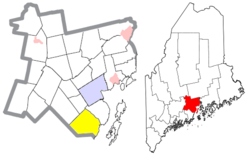2010 census
As of the census [9] of 2010, there were 2,164 people, 959 households, and 635 families living in the town. The population density was 58.0 inhabitants per square mile (22.4/km2). There were 1,465 housing units at an average density of 39.2 per square mile (15.1/km2). The racial makeup of the town was 97.9% White, 0.3% African American, 0.3% Native American, 0.4% Asian, 0.1% Pacific Islander, and 0.9% from two or more races. Hispanic or Latino people of any race were 0.8% of the population.
There were 959 households, of which 25.4% had children under the age of 18 living with them, 55.1% were married couples living together, 6.9% had a female householder with no husband present, 4.3% had a male householder with no wife present, and 33.8% were non-families. 26.1% of all households were made up of individuals, and 10.1% had someone living alone who was 65 years of age or older. The average household size was 2.26 and the average family size was 2.70.
The median age in the town was 47.5 years. 19.7% of residents were under the age of 18; 5.2% were between the ages of 18 and 24; 21.5% were from 25 to 44; 35.8% were from 45 to 64; and 17.7% were 65 years of age or older. The gender makeup of the town was 50.8% male and 49.2% female.
2000 census
As of the census [10] of 2000, there were 2,042 people, 846 households, and 605 families living in the town. The population density was 54.6 inhabitants per square mile (21.1/km2). There were 1,272 housing units at an average density of 34.0 per square mile (13.1/km2). The racial makeup of the town was 98.78% White, 0.05% African American, 0.15% Native American, 0.20% Asian, 0.05% Pacific Islander, 0.39% from other races, and 0.39% from two or more races. Hispanic or Latino people of any race were 0.83% of the population.
There were 846 households, out of which 31.7% had children under the age of 18 living with them, 61.7% were married couples living together, 6.5% had a female householder with no husband present, and 28.4% were non-families. 22.9% of all households were made up of individuals, and 9.5% had someone living alone who was 65 years of age or older. The average household size was 2.41 and the average family size was 2.82.
In the town, the population was spread out, with 23.1% under the age of 18, 4.9% from 18 to 24, 28.2% from 25 to 44, 29.8% from 45 to 64, and 14.0% who were 65 years of age or older. The median age was 42 years. For every 100 females, there were 99.8 males. For every 100 females age 18 and over, there were 98.0 males.
The median income for a household in the town was $42,273, and the median income for a family was $48,500. Males had a median income of $32,006 versus $28,077 for females. The per capita income for the town was $21,621. About 7.0% of families and 9.1% of the population were below the poverty line, including 9.8% of those under age 18 and 9.5% of those age 65 or over.




